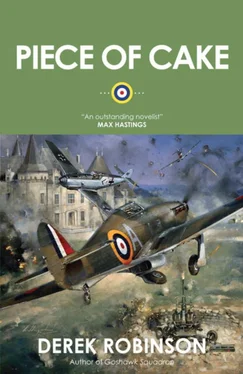The field was littered with broken Defiants and fire-trucks and blood-wagons when Hornet squadron got scrambled. They made a good interception on a bunch of Heinkels just as they were bombing the giant aerials at Pevensey. Haducek destroyed a Heinkel but the escort was heavy and in the frantic scrap that followed, Sergeant Todd got shot down. There was no parachute.
Each flight was scrambled once during the afternoon. “A” flight found nothing. “B” flight chased a raid back across the Channel but most of its pilots were always out of gun-range.
A flood of black cloud was hurrying in from the west when the squadron took off early in the evening. They climbed to twenty-two thousand feet and joined a squadron of Hurricanes from North Weald, just north of London. The raid they had been given was making its approach up the Thames estuary: fifty-plus bombers covered by forty Me-110’s; these in turn were protected by a great swarm of 109’s.
When Barton sighted this mass of aircraft churning toward him he felt a surly resentment: why was it always so one-sided? Why couldn’t they for once fight on even terms? Or even—what a luxury!—outnumber the enemy? The feeling passed, and half a minute later he was astonished to see all the 109’s and half the 110’s detach themselves and fly south.
“Low on fuel,” CH3 suggested.
“Not the 110’s,” Barton said.
“They’re low on appetite,” Cox said.
This seemed the explanation. As soon as the Hurricanes peeled off to attack, the 110’s formed their familiar tail-chasing circle. The fighters ignored them and concentrated on the bombers, harrying and chivying the flanks to drive them off course. Fitzgerald broke from one such attack and discovered that he had lost his wingman. Flash Gordon had gone.
He climbed, weaving to search, and glimpsed a solitary Hurricane inside the ring of 110’s, whizzing around, vertically banked. It had to be Gordon. A Messerschmitt fell out of formation and the Hurricane dropped behind it, squirting flame. Fitz opened his throttle wide and went down to guard his wingman’s back.
After a couple of thousand feet he was scrabbling at the inside of his windscreen, scraping off the ice-crystals that had formed. When the screen was clear again his Hurricane was still half a mile behind the fight, although the airspeed was frighteningly high and the controls were so stiff that it took both hands to budge the stick. His ears were buzzing like doorbells and his skull felt too tight for his brain. The ground looked strangely fuzzy, like a map left out in the rain, but Flash and the 110 were still clear enough and Fitz guessed there was haze or fog down there. The German saw barrage balloons coming up and he sheered away, back toward the estuary. Again Fitz’s windscreen iced-up and he pressed against his straps as he cleaned it. His sinuses throbbed and a flicker of blood fell from his nostrils and splashed on the panel. He braced himself and hauled back, and leveled out in the yellow haze. The others had disappeared.
He licked blood from his upper lip and snuffled it up his nose. The smoky sky fled past him. What to do? Flash wouldn’t give up, not yet anyway. What about the Hun? The Hun would go on down and try to sneak home at wavetop height. Fitz went down in search of them. In fact he overshot the 110, which was limping along on one engine. The haze turned into a dense sea-mist. He throttled back and gave it another ten seconds; then he was going home. The 110 limped up behind him. It was sheer luck. The pilot fired an enormous five-second burst that lit up the murk with brilliant tracer. All the cannonshells and almost all the bullets missed but a dozen rounds ripped into the Hurricane’s instrument panel. Fitz broke left: the wrong way, he remembered too late, but it didn’t matter, the 110 wasn’t looking for a fight. It limped on home and claimed a definite kill.
Fitz circled while he checked the damage. His engine sounded healthy but the Hurricane would not climb. Whenever he tried to get above the fog a vigorous vibration began and the plane threatened to stall. He increased his speed but that only made the vibration worse, so bad that he was afraid something would snap, and he gave up. There was no visible sun. He set course to the southwest, reckoning to put down somewhere on the Kent coast, on sands or mudflats or something.
After three minutes he got a twinge of worry, checked his course, and was shocked to see that he was heading northwest . Even so, he knew he should be over land by now. It was time to get help. He changed channels and called Mayday. No answer. He looked to be sure he had pressed the Mayday button and his radio lead swung free. It had been severed. Sweat suddenly surfaced all over his arms and chest. He checked his course again: southeast, turning to south. The compass was bust.
He had no idea which way he was going. The fog was as gray on the left as on the right. The one thing he did know was that his present course was wrong. The longer he held it, the more fuel he wasted. He circled while he searched for a glimmer of guidance and found none. Land was near; he knew it was only minutes away. He had to decide. The longer he circled, the worse his chance of survival became.
One patch of fog looked fractionally brighter, so he headed for that. In the tracking station on the North Foreland, the operators studying their cathode-ray tubes saw the plot begin to edge away. They tracked it for fifteen minutes, until the echoes faded, far out in the North Sea.
By nightfall it was obvious that someone would have to go and see Mary. The adjutant went.
She took the news remarkably well. Sitting in the golden glow of an oil lamp, with her feet on a cushion and her fingers linked under her belly, she conveyed a sense of serenity. After a while she conveyed so much of it that Kellaway became worried. “This couldn’t have come at a worst time, could it?” he said. “You must let us know what help you need.”
“Oh, well… there’s still hope, isn’t there? I expect he’ll turn up. He always has.”
“I’m afraid it’s pretty serious this time, Mary.” He made his voice sound grave. “Miracles sometimes happen, I realize that, but…” He shook his head.
“You said he hasn’t been found yet.”
“No, he hasn’t.”
“So he’s only missing.”
“I’m afraid all the indications are that he’s gone for good.”
“How can you say that? If you haven’t found him.”
“It’s all a bit technical. I can’t really explain, I’m afraid.”
“Well, until he’s found he’s only missing, isn’t he? And as long as he’s missing he’s liable to turn up at any moment. I bet you he does.” Kellaway didn’t take the bet. He left as soon as he decently could.
On the afternoon when Sergeant Todd was to be buried, the plotting tables in the ops room showed large German raids assembling over Calais and Boulogne. No pilots could be released. The adjutant represented the squadron.
Todd’s family lived in Yorkshire. His mother was dead and his father, an ex-miner, was bedridden with lung disease; but he had a brother, who came down with his wife. Kellaway took them to the cemetery, and afterward invited them to his office for a drink. They were both about thirty, neatly dressed, sad but calm. Everyone took whiskey and water. “I’d like to drink to the memory of a gallant pilot,” Kellaway said. They drank. “I realize that nothing can make good his loss,” Kellaway said, “but we’d all like you to know what a splendid contribution he made to the work of this squadron.”
“Did he?” the brother asked, rather sharply.
“Yes, indeed. Everyone commented on the determined way he pressed home his attacks. He certainly made his mark on the enemy.”
Читать дальше












